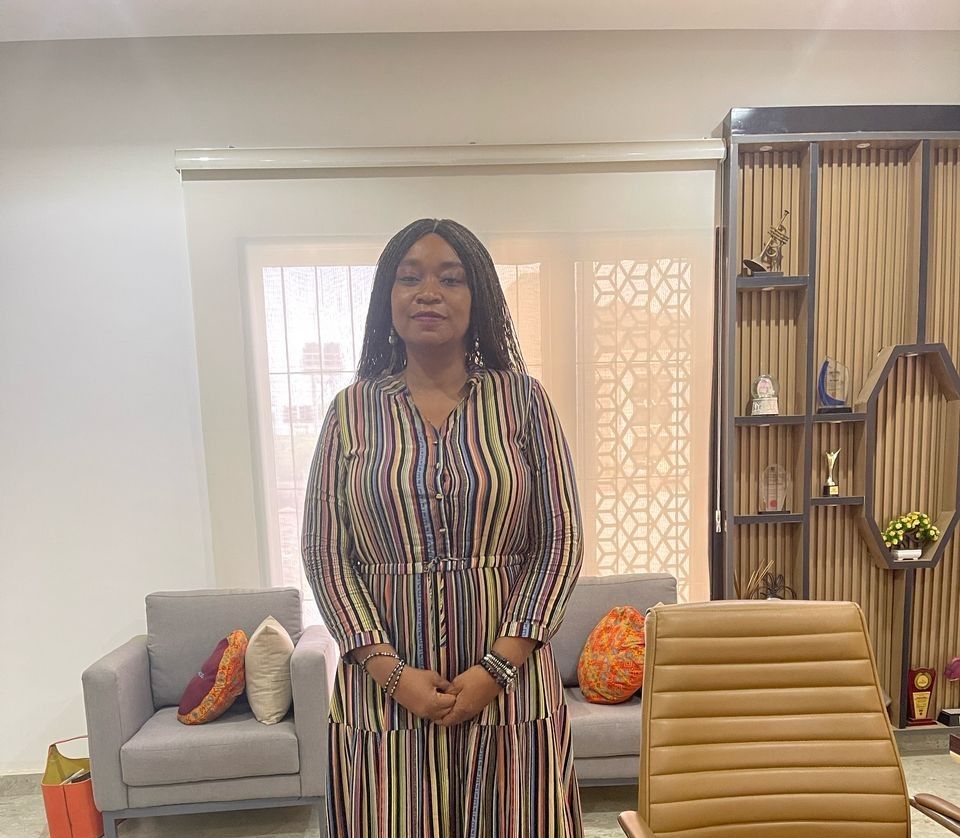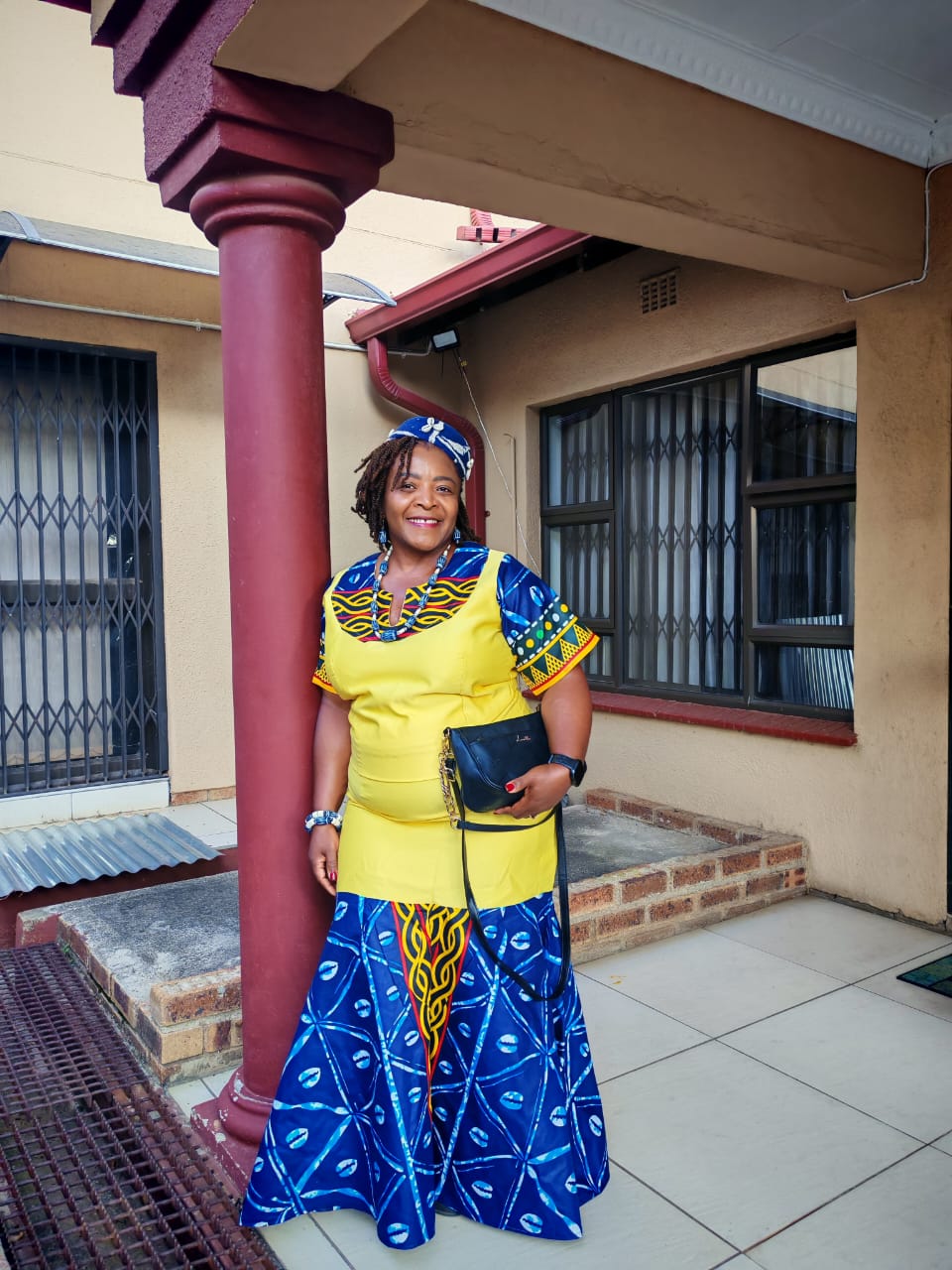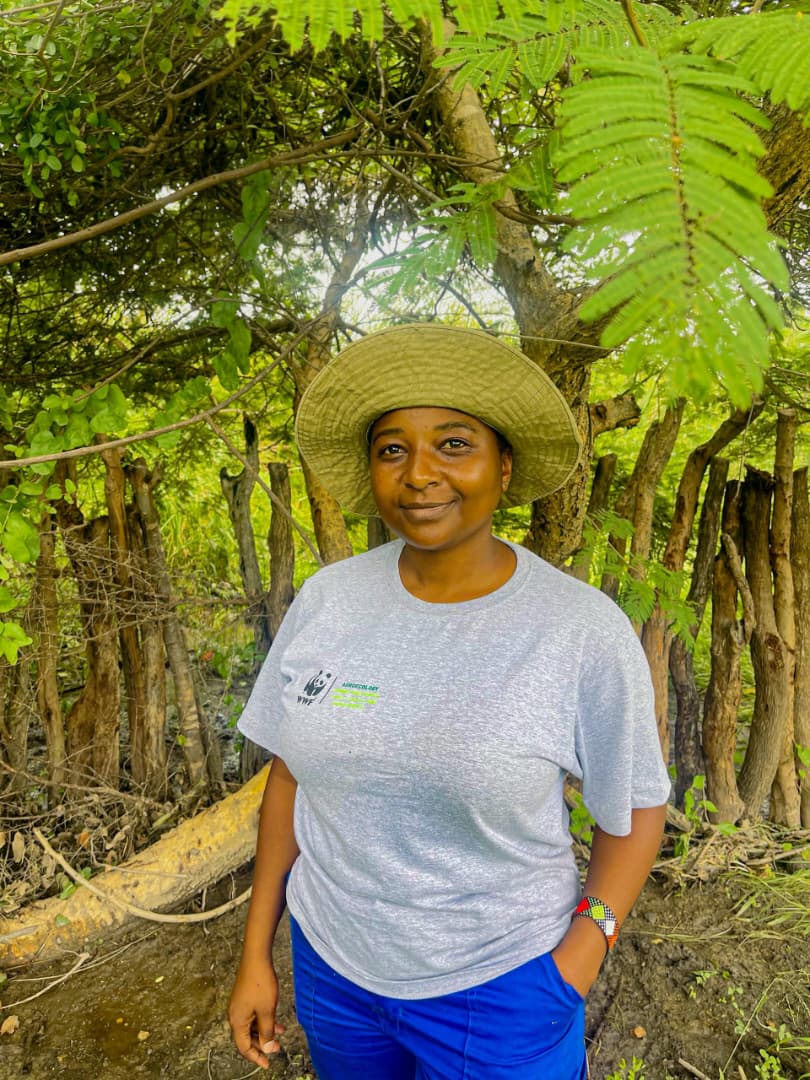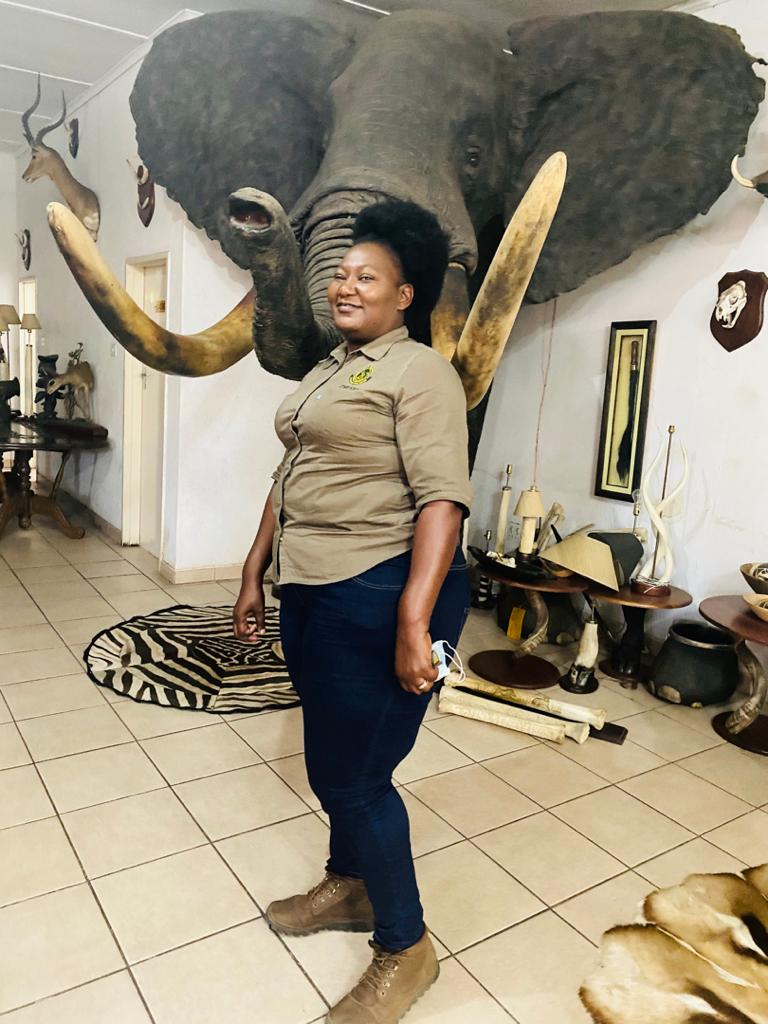This interview is part of a series profiling the stories of the 2024 WE Africa leadership programme fellows, African women in the environmental conservation sector who are showing up with a strong back, soft front, and wild heart.
***

Ngozi Ifeoma Malo has spent her whole life chasing. Chasing knowledge. Chasing justice. Chasing excellence.
“As a kid, I competed with others. As an adult, I compete with myself. Once I hit one goal, I immediately ask myself, what’s next? What’s bigger than this?” she poses.
And now, more and more, she’s asking herself why.
Is it the need to fill a void? An addiction to the high that comes with achievement? And more importantly, when would it ever be enough?
“My parents were content people. I don’t know where this drive to overachieve came from,” she says.
Previously, the chasing had never seemed like a bad thing. Now, she is tired. Not just physically but mentally. Emotionally. The endless climb has taken its toll, and it was her mother’s passing that finally made her stop and question it all.
She had been in the room, holding her mother’s hand as she took her last breath. She had gently removed the wedding ring…the rosary—objects that once held so much meaning. In that heartbreaking moment, Ifeoma saw how quickly everything that once seemed so essential could become so irrelevant.
She was no longer asking, What’s next for me? She was asking, Who, other than me, could benefit?
Ifeoma had arrived at her place of contentment. And maybe, just maybe, that was the most freeing thing of all.
***
Ifeoma grew up in a middle-class Nigerian home. Her parents were civil servants with steady jobs. She went to excellent schools. She loved to read. And she was that kid: the small but mighty one.
Most adults found her irritating. Not because she was rude but because she questioned everything. They’d lay down a rule, and then she’d come along, arms folded, head tilted, asking the one question nobody wanted to hear: “Why?”
It drove them mad.
But still, she talked—scratch that—argued. “I had a very strong sense of right and wrong and didn’t condone unfairness,” she says.
Take childhood mischief, for example. The classic Nigerian (and indeed African) household tactic was collective punishment. If one child misbehaved, everyone paid the price. Efficient? Maybe. Fair? Absolutely not. And Ifeoma would have none of it. “It wasn’t us,” she’d say. And then, she would give a blow-by-blow account of what exactly happened. Her parents would shake their heads and say, “This girl can argue her way out of anything.”
***
When she was nine, she was sent to boarding school. She describes it as one of the most traumatic periods of her life.
“I regret it so much because I feel like those are the years when kids need their mothers the most,” she says. “That’s when your body is changing, your mind is questioning everything—and instead of having guidance, you’re thrown into an environment with a bunch of other confused kids, under the watch of overworked, underpaid administrators who don’t have the time or patience to help you figure things out.”
To make things worse, Ifeoma was the child who asked questions.
“I’d ask the teachers and matrons why we had to follow these outdated rules, especially the ones that only applied to girls and not boys.”
That’s why she spent most of her time in detention; she was constantly being punished for questioning things that didn’t make sense. It was Ifeoma’s first real taste of injustice, and she hated it.
“I remember leaving secondary school with this heavy sense that the world was deeply unfair,” she says.
***
Ifeoma knew she would be a lawyer and moved with the kind of conviction that made people nervous. In Nigeria, when picking universities, most students hedge their bets: Law for the first choice, maybe Political Science for the second, and something different for the third, just in case. Not Ifeoma. Every single one of her choices was Law.
And this wasn’t some last-minute teenage epiphany. She had receipts.
From as early as eight, she was writing it all down. Her dad had her keep journals. In those pages, she was freeing innocent prisoners locked up by corrupt police officers and championing women’s rights in communities that had forgotten them.
Even while in high school, she continued to keep a journal. But one day, it was stolen from her by a bunch of mean girls. They mocked her, humiliated her and turned her deepest, most private thoughts into a public spectacle.
Ifeoma stopped writing. It just wasn’t worth the trouble anymore.
***
University was intoxicatingly freeing. But freedom, without direction, can be dangerous. And Ifeoma learned this the hard way. She fell into bad relationships and neglected her studies.
“It was my time of debauchery,” she says. “But even as I was making bad decisions, there was always this little voice in my head reminding me of the values my parents instilled in me. I’d be thinking, Ify, you know this isn’t right. What if Mummy or Daddy finds out? And that thought alone would pull me back from the edge. Their disappointment was worse than any punishment.”
In her third year, Ifeoma locked in. “I remember sitting down and telling myself, you need to get your act together. This course isn’t even that hard. The exams aren’t that hard. Just do it.”
And she did. Despite all the catching up she had to do, she still got a distinction in Law.
“If I hadn’t wasted those first two years, I would have easily graduated with a first-class degree,” she says.
Soon after, Ifeoma decided she would study for her Master’s degree in the US. Her mum, who called the country Sodom and Gomorrah, didn’t bless the idea. But Ifeoma didn’t wait for approval. She secured a full scholarship, got admission, handled the visa and bought her flight ticket. By the time she told her parents she was leaving, everything was in place.
Her dad looked at her and said, “You must go.”
***
Interestingly, Ifeoma never ended up practising Law. Instead, she followed in her parents’ footsteps and ended up working in the government. She was the Senior Adviser and technical aide to two Nigerian Ministers, the first is now the Director General of the WTO. The second was the Minister of Power and Electricity. The latter role set her out on her journey to providing off-grid electricity to rural communities across Africa.

Young engineers and electricians would come to Ifeoma, brimming with innovative solutions for Nigeria’s power crisis. But every time she tried to push their ideas forward, she hit the same wall: There was no budget for such things.
What’s worse, these ideas would be stolen, repackaged and handed off to politically connected contractors who knew nothing about the work.
It was corrupt, and it was exhausting.
Ifeoma had seen enough.
Walking away from a stable job wasn’t easy. She had no entrepreneurial background or blueprint for how to start a business. But Ifeoma knew one thing: If the system wouldn’t support these innovators, she would. And that is how her energy innovation centre, Clean Tech Hub was born.
“We failed so many times,” she says. “There was a point when we ran out of money completely, and I had to move my kids and myself back home with my mom. Looking at where we are today, it’s almost surreal.”
Nine years later, Clean Tech Hub now operates in six countries, with a team of 36 full-time employees and 20 more working part-time. They’ve secured permanent headquarters and are in the process of building plastic recycling plants.
***
Ifeoma had just landed in Dubai for a COP conference when the call came.
“They found her semi-conscious in her room,” the doctor said.
These words were in reference to her mother, who’d had a stroke. Ifeoma immediately changed her ticket to catch the next flight back home.
While she waited at the airport, the doctors called again. They had run scans and found extensive blood clots in her mother’s brain. None of this made sense to Ifeoma. Just the day before, her mum had been OK. She had gone to the market, spent hours there as always, and returned home. Suddenly, everything had changed.
The doctors had to operate immediately. Waiting any longer meant risking more brain damage. Ifeoma gave her consent over a video. By the time she landed, the surgery was over.
When Ifeoma entered the hospital room, she took her mother’s hand. Her mother squeezed it and whispered, “You’re here. I knew you would come.”
And then came the night she passed.
Holding her mother’s hand for the last time, something in Ifeoma shifted. The carefree woman who once moved through life with certainty, believing she could handle anything, suddenly felt more reflective.
“Watching my mother die was the biggest thing that’s ever happened in my life. It gave me a sense of just how fickle and how deep life is,” she says.
Their relationship had been complicated in Ifeoma’s younger years. As a traditional woman, her mother had expected a conventional path for her—get an education, get married, have children, and have a steady civil service career. But Ifeoma had always been different; she wanted more. She questioned things. She challenged norms.
“I gravitated toward my father, who would explain life to me in a way she never did. For a long time, I felt misunderstood by my mum,” she says.
“As I grew older and began to understand life, I saw my mother in a new light, and we grew closer. My dad had been a great father but not always the best husband to her. She’d suffered a lot in life, and I don’t think he ever quite appreciated that,” she says.
When COVID hit, Ifeoma brought her mother to live with her. Those four years became the most joyful of her mother’s journey.
“She wasn’t just a mother or a widow—she was her own person,” Ifeoma reflects. “She had spa days, she travelled with me, she became my adventure partner.”
Sixteen years after losing her husband, Ifeoma’s 75-year-old mother found love again—with a kind, elderly gentleman who lived in the same estate.
“It was the sweetest thing,” Ifeoma recalls. “They would take long walks, sit on a bench, and talk for hours. At first, she tried to hide it from everyone, which was hilarious. But I assured her she didn’t need anyone’s permission. She deserved happiness. And I’ll never forget the relief on her face when I said it.”
From then on, she’d openly cook for her boyfriend and send Ifeoma to deliver the meals. She’d also accept the flowers and dresses he would bring her. It was a beautiful thing to witness.
And that, in Ifeoma’s words, is “what makes it all so unfair”.
After a lifetime of duty and sacrifice, just when it was finally her time to live, mama was gone.
“Her passing changed me,” she says.
***
One of those elite programs designed for accomplished professionals like Ifeoma recently landed in her inbox. A year ago, she would have looked at the prestige and challenge and jumped at it. And truthfully, she knows she would have been selected.
But this time, she paused.
She thought about how, realistically, these programs only take a handful of Black women. Did it have to be her? Did she need one more accolade?
Instead of taking up the space, she passed the opportunity onto other capable women in her network. And this has been the case for Ifeoma ever since—furiously, dropping keys for other unrepresented or underrepresented women.
Losing her mother broke her heart, but it also rewired her soul. Ifeoma’s pursuit of achievement has softened into a wisdom that is less about ambition and more about intention. Because, in the end, legacy isn’t just what we build for ourselves; legacy is also the spaces we create for others to rise.





